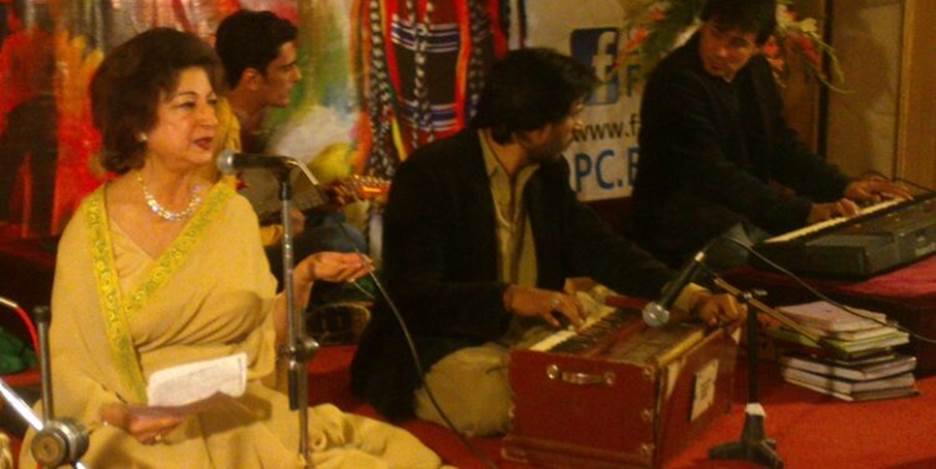
Nahid Niazi – Pakistan’s Forgotten Nightingale
By Siraj Khan
Boston, MA

Pakistan in its almost 75 years of history has had many great female singers, but there has been just one nightingale. – Nahid Niazi. Interestingly, her story started much before she was even born. If you are wondering why I say this, please read on.
Former Prime Minister Imran Khan’s connections go well beyond the boundaries of cricket and politics. One of his father’s cousins Sajjad Sarwar Khan Niazi was a talented lyricist as well as music composer, who served as Director of Radio Peshawar and later Radio Pakistan Karachi as well. As a poet and musician, he is best known for his nazm Ik baar phir kaho zara.
On 16 December 1937, Radio Lahore went on air and based on her popularity among Punjabi music enthusiasts and also because she regularly visited Radio Peshawar for broadcasts, a young lady named Miss Shamshad was selected to perform this nazm at the debut broadcast. As an approved singer in the genre of folk, she used to sing Punjabi solos, duets and chorus songs created mostly by composers Master Inayat Hussain and Bhai Budh Singh Taan. Miss Shamshad was later to become the iconic Shamshad Begum that we know today.
Sajjad was blessed with five beautiful daughters. Little did he know that one of them, Shahida, would end up recording this nazm 30 years later (under her assumed name Nahid) in the same composition but in her own voice, making it not only an immortal non-filmi classic, but through it also creating a unique bond with her father, which will continue perhaps forever.
In many ways, Nahid was never in the mainstream singers’ fraternity. She was still attending St Joseph’s Convent School Karachi when she recorded her first song for Laila Majnu. While Laila Majnu released in April 1957 was her first film, Khwaja Khurshid Anwar’s Mohe piya milan ko jaane de was her first major hit. She then went on to The College of Home Economics, first in Karachi and then Lahore, where the family relocated. On days of rehearsals and song recordings, she would often attend with her notebook and at times coming straight from college, doing her recording and leaving right away to attend to her college assignments. With more time available post-graduation, her recordings moved up into high gear rather dramatically, and so did her personal life. She got married to composer Moslehuddin in January 1964, who hailed from East Pakistan. By then, he too had become an established and sought-after music director who composed and recorded many of her popular songs, remembered even today.
Apart from her husband Moslehuddin, Nahid Niazi sang for almost all major composers including Rasheed Attre, Khwaja Khurshid Anwar, Nashad, Safdar Hussain, Rehman Verma, Saif Chughtai, Khalil Ahmed, Nisar Bazmi, Master Inayat Hussain, Robin Ghosh, Sohail Rana, Saleem-Iqbal, Akhtar Hussain Akhian, Hasan Latif, GA Chishti, Ashiq Hussain, Debu Bhattacharya and many others.
She provided playback to almost all top actresses of her time, recording over 330 songs for over 150 films in Urdu, Punjabi and Bengali – and many non-filmi tracks. During the period 1960-1964 itself, she recorded over 60 songs.
I am taking the liberty of sharing here just a few songs from my personal selection.
Nahid Niazi settled down in the UK and lives in Birmingham. She continues to work on music projects and frequently records TV programs for BBC and other channels. I was privileged to spend some time with her in November 2014, when I was there on a consulting assignment, and then again in June 2015 at a family wedding in London.
Nahid Niazi and Moslehuddin were both recipients of the President’s Pride of Performance and Tamgha-e-Imtiaz medals presented to them by the President of Pakistan in 1969.
I thought I would close with a very soulful but unusual composition of Moslehuddin. In Mujhe Apni Dunya Mein Wapas Bulale ( Deewana, 1964) , the maestro used the voices of Nahid Niazi and her four sisters to provide the haunting chorus support to Madam Noor Jehan. This rare gem could very well go down in history as the first and perhaps only pure choir used in a Pakistani film song, which featured the convent-trained voices of five biological daughters of an accomplished father, and the creator of the immortal Ik baar phir kaho zara.
How often can that happen!
(Karachi-born, Boston-based Siraj Khan is a connoisseur of Southasian films and music. He believes in art and culture as essential bridges between people and places. A global finance and audit specialist by profession, he has written scripts and directed concerts across the USA, UK, Southasia and UAE. He sits on the board of several nonprofits and charities in America, Pakistan and India and has been recognized for his work towards women’s empowerment and services to children and youth. )

